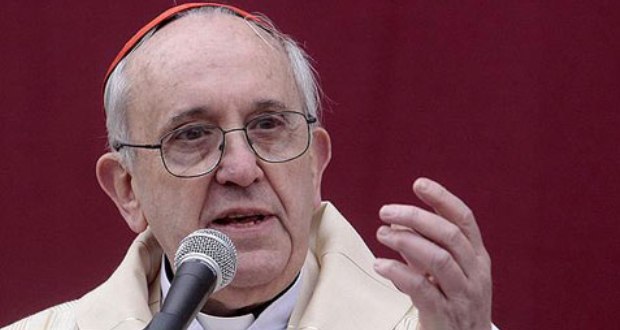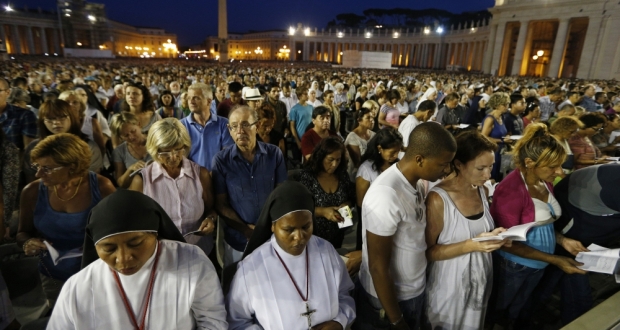Pope Francis’ Letter to the Founder of the Italian Newspaper “La Repubblica”

The following is the translation of the letter written by Pope Francis to the founder of “La Repubblica” Italian newspaper Eugenio Scalfari, addressing several issues raised by him in various articles. In this letter, the Holy Father addresses both Mr. Scalfari and non-believers.
Dear Dr. Scalfari,.
It is with wonderful cordiality, although just in broad lines, that with this letter I would such as to respond to your letter, resolved to me on July 7 in the pages of La Reppublica, with a series of your personal reflections, which you then improved on the pages of the same daily on August 7.
I thank you, first of all, for the attention with which you read the encyclical Lumen fidei. The purpose of my beloved Predecessor, Benedict XVI, who conceived it and to a fantastic extent composed it, and which I received with gratitude, is directed not only to verify in the faith in Jesus Christ those who recognize themselves in it, but also to arouse a sincere and extensive dialogue with those whom, like you, explain themselves “a non-believer for many years interested and captivated by the preaching of Jesus of Nazareth.”.
It seems to me that it is nothing various other than favorable, not just for us individually however also for the society in which we live, to pause to discussion on a reality as crucial as the faith is, which calls to preaching and to the figure of Jesus. I think there are, in particular, 2 scenarios that today render this discussion right and proper and precious. As kept in mind, it constitutes one of the principal goals of Vatican Council II, wanted by John XXIII and the ministry of Popes that, each one with his sensibility and contribution, from then to today has followed in the track traced by the Council.
The first situation– as recalled in the initial pages of the encyclical– comes from the fact that, in the course of the centuries of modernity, we have actually witnessed a paradox: the Christian faith, whose novelty and incidence on the life of man since the beginning were expressed in fact through the symbol of light, was frequently referred to as the darkness of superstition that is opposed to the light of reason. Thus between the Church and the culture of Christian inspiration, on one hand, and the modern culture of Enlightenment stamp, on the various other, there has actually been incommunicability. Furthermore the time has actually come, and the Vatican in fact inaugurated the period, of an open dialogue without preconceptions, which opens the doors for a serious and fecund conference.
The second situation, for one who looks for to be devoted to the present of following Jesus in the light of faith, comes from the reality that this discussion is not a secondary accessory of the existence of the believer: it is, rather, a profound and important expression. In this connection, enable me to quote an affirmation of the encyclical, which in my opinion is extremely important: because the truth seen by faith is that of love– it is highlighted– “it is clear that the faith is not intransigent, but grows in coexistence that respects the other. The follower isn’t really big-headed; on the contrary, fact makes him modest, knowing that, more than our possessing it, it is reality that welcomes and has us. Far from hardening us, the certainty of the faith puts us on the way, and enables witness and discussion with everybody” (n. 34). This is the spirit that animates the words that I write to you.
For me, faith is born from the encounter with Jesus. A personal encounter, which has actually touched my heart and offered instructions and brand-new meaning to my presence. But at the same time an encounter that was made possible by the community of faith in which I have actually lived and thanks to which I found access to the knowledge of Sacred Scripture, to brand-new life that, as gushing water, streams from Jesus through the Sacraments, to fraternity with everyone and at the service of the inadequate, real photo of the Lord. Believe me, without the Church I would not have had the ability to run into Christ, also in the awareness that the immense present that faith is is kept in the vulnerable earthen vessels of our humanity.
Now, it is specifically beginning from here, from this personal experience of faith resided in the Church, that I feel at ease in listening to your questions and in seeking, together with you, the ways through which we might, possibly, start a segment of the method together.
Forgive me if I do not follow step by step the arguments you suggest in the editorial of July 7. It appears to me more productive, if not more congenial, to enter a particular sense to the heart of your factors to consider. I will not even become part of the explanatory method followed by the encyclical, where you regard the lack of an area dedicated specifically to the historic experience of Jesus of Nazareth.
To begin, I observe just that an analysis of this kind isn’t secondary. It is, in fact, by following the logic that guides the unfolding of the encyclical, pausing our attention on the meaning of what Jesus stated and did and therefore, in a word, on what Jesus was and is for us. The Letters of Paul and the Gospel of John, of which specific reference is made in the encyclical, are built, in fact, on the strong foundation of the messianic ministry of Jesus of Nazareth, which reached its decisive conclusion in the Pasch of Death and Resurrection.
For that reason, one need to be confronted with Jesus, I would state, in the concreteness and roughness of his event, as is narrated especially by the earliest of the Gospels, that of Mark. One sees then that the “scandal” that the word and practice of Jesus caused around him stem from his extraordinary “authority”: a word, this is, that attests from the Gospel of Mark, but which isn’t easy to render in Italian. The Greek word is “exousia,” which literally describes that which “comes from being,” which is. It’s not about something outside or forced, therefore, however of something that emanates from within which imposes itself. Jesus, in fact, strikes, breaks, innovates beginning with– He himself says so– from his relationship with God, called familiarly Abba, who offers Him this “authority” so that he will exercise it in favor of men.
Jesus preaches “as one who has authority,” heals, calls the disciples to follow him, forgives … all things that, in the Old Testament, are of God and just of God. The concern that return most in Mark’s Gospel is: “Who is he who …?” and which describes Jesus’ identification, is born from witnessing an authority that is different from that of the world, an authority that is not aimed at exercising power over others, but of serving them, of giving them liberty and the volume of life. And this to the point of putting at stake one’s own life, to the point of experiencing incomprehension, betrayal, rejection, to the point of being condemned to death, of sealing the state of abandonment on the cross. However Jesus remains devoted to God, to the end.
And it is precisely then– as the Roman centurion exclaimed at the foot of the cross in Mark’s Gospel– that Jesus shows himself paradoxically as the Son of God! Son of a God that is love and that desires with all His being that man, every man, discover himself and also live as His real son. This is, for the Christian faith, the certification of the truth that Jesus is risen: not to triumph over those who rejected him, but to testify that the love of God is stronger than death, the forgiveness of God is stronger than any sin, and that it is worthwhile to invest one’s life, to the end, seeing this enormous gift.
The Christian faith thinks this: that Jesus is the Son of God who pertained to offer his life to open to all the way of love. Because of this you are right, egregious Doctor Scalfari, when you see in the Incarnation of the Son of God the foundation of the Christian faith. Tertullian already wrote “caro cardo salutis,” the flesh (of Christ) is the foundation of salvation. Due to the fact that the Incarnation, specifically, the truth that the Son of God can be found in our flesh and shared our happiness and sadness, the victories and beats of our existence, to the cry of the cross, living every little thing in love and fidelity to Abba, attests to the astonishing love that God has for every man, the inestimable value that he offers him. Because of this, each one of us is called to make his own the look and the choice of love of Jesus, to enter into his method of being, of thinking and acting. This is the faith, with all the expressions that are explained unfailingly in the encyclical.
Constantly in the editorial of July 7, you ask me in addition how you can understand the originality of the Christian faith in as much as it is founded on the Incarnation of the Son of God, in regard to other faiths that gravitate instead around the absolute transcendence of God.
The originality, I would say, lies specifically in the reality that the faith makes us get involved, in Jesus, in the relationship that He has with God who is Abba and, in this light, the relationship that He has with all other men, including opponents, in the indicator of love. In other words, Jesus’ offspring, as provided by the Christian faith, is not revealed to mark an insurmountable separation between Jesus and all others: however to tell us that, in Him, we are all called to be children of the one Father and brothers among ourselves. The singularity of Jesus is for communication, not for exemption.
Of course from this likewise follows– and it isn’t something small– the distinction in between the religious sphere and the political sphere which is sanctioned in “giving to God exactly what is God’s and to Caesar exactly what is Caesar’s,” affirmed plainly by Jesus and on which, laboriously, the history of the West was built. In fact, the Church is called to sow the leaven and the salt of the Gospel, and this is the love and mercy of God that reaches all men, mentioning the celestial and conclusive objective of our fate, whereas civil and political society has the tough job of articulating and embodying in justice and uniformity, in law and in peace, an ever more human life. For one who lives the Christian faith, this does not imply running away the world or looking for hegemony, but service to man, to the entire of man and to all men, beginning from the fringes of history and keeping awake the sense of hope that drives one to do excellent regardless of every little thing and constantly aiming to the beyond.
You also ask me, in conclusion of your first article, what we should say to our Jewish brothers about the pledge made to them by God: has it all come to nothing? Believe me, this is a question that challenges us significantly as Christians, because, with the help of God, specifically because Vatican Council II, we have actually found that the Jewish people are still for us the holy root from which Jesus sprouted. In the relationship I cultivated in the course of all these years with Jewish brothers in Argentina, commonly in prayer I likewise questioned God, especially when my mind went to the memory of the dreadful experience of the Shoa. What I can state to you, with the Apostle Paul, is that God’s fidelity to the close covenant with Israel never ever failed which, with the horrible trials of these centuries, the Jews have actually kept their faith in God. And for this, we will never ever be sufficiently grateful to them as Church, however likewise as humankind. They, then, precisely by standing firm in the faith of the God of the Covenant, called all, likewise us Christians, to the truth that we are constantly waiting, as pilgrims, for the Lord’s return and, for that reason, that we must constantly be open to Him and never take sanctuary in what we have currently attained.
So I come to the 3 questions you put to me in the short article of August 7. It seems to me that, in the first 2, exactly what is in your heart is to comprehend the attitude of the Church to those who don’t share faith in Jesus. To start with, you ask me if the God of Christians forgives one who does not think and does not seek the faith. Premise that– and it’s the fundamental thing– the mercy of God has no restrictions if one relies on him with a sincere and contrite heart; the question for one who doesn’t believe in God depends on obeying one’s conscience. Sin, likewise for those who do not have faith, exists when one breaks one’s conscience. To listen to and to obey it indicates, in fact, to choose in face of exactly what is perceived as excellent or evil. And on this decision turns the goodness or malice of our activity.
In the second location, you ask me if the idea, according to which no outright exists and therefore not even an outright truth however only a series of relative or subjective truths, is an error or a sin. To begin with, I will not speak, not even to one who thinks, of “outright” reality, in the sense that absolute is what is irregular, exactly what is deprived of any relationship. Now truth, according to the Christian faith, is the love of God for us in Jesus Christ. Fact is a relationship! Real is it that each one of us also takes up the fact and shares it from him/herself: from his/her history and culture, from the situation in which he/she lives, etc. This doesn’t mean that reality is variable or subjective, rather the opposite. Is indicates that it is given to us always and just as a means and a life. Did not Jesus himself say: “I am the Way, the Truth, and the Life”? Simply puts, fact being completely one with love, needs humbleness and openness to be sought, gotten and shared.
It’s needed to understand one another well on the terms and, possibly, to come out of the tight areas of opposition … outright, to pose the concern again in depth. I think that this is today definitely essential to start that serene and useful discussion that I expected at the beginning of this my feedback. In the last question you ask me if, with the disappearance of man on earth, the idea will likewise disappear that is able to think about God. Certainly, man’s greatness depends on his having the ability to think about God. And that is in being able to live an aware and accountable relationship with Him. Nonetheless, the relationship is in between two truths. God– this is my idea and this is my experience, however how many, the other day and today, share it!– is not an idea, even though really lofty, fruit of man’s thought. God is truth with a capital “R.” Jesus discloses it– and lives the relationship with him– as a Father of goodness and infinite mercy.
Thus, God doesn’t depend on our idea. Even when the life of man on earth ought to finish– and for the Christian faith, in any case, this world as we understand it is predestined to fall short–, man will not stop existing and, in a means that we do not understand, also the universe produced with him. Scripture mentions “brand-new heavens and a brand-new earth” and verifies that, in the end, in the where and when that is past us, however towards which, in faith, we often tend with desire and expectation, God will be “all in all.” Egregious Doctor Scalfari, I hence conclude my reflections, aroused by what you wanted to connect to me and ask me. Receive it as the tentative and provisional however sincere and confident answer to the invite to escort you in a segment of the roadway together. Believe me, the Church in spite of all the slowness, the unfaithfulness, the errors and sins she can have committed and can still commit in those that accompany her, has no other sense or end however that of living and experiencing Jesus: He who was sent out by Abba “to preach good news to the bad, to proclaim launch to captives, and recovering of sight to the blind, to set at liberty those who are oppressed, to proclaim the appropriate year of the Lord” (Luke 4:18 -19).






